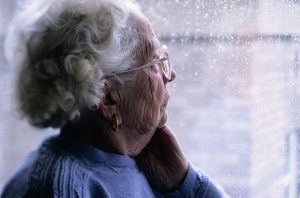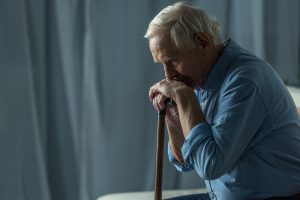Serving Oklahoma‘s Elder Abuse Victims and Their Families
Approximately 2 million cases of elder abuse are reported every year in the United States, and many involve nursing homes or assisted-care facilities.
The nursing home abuse lawyers at Carr & Carr Attorneys at Law have extensive experience in neglect and abuse cases, and we’re dedicated to protecting the rights of our vulnerable elderly population.
If you believe a loved one is a victim of nursing home abuse or neglect in Oklahoma, it’s important to take action as soon as possible.
Call our nursing home abuse attorneys today at 866-510-0580 or contact us online for your free consultation.
Elder Abuse Defined
Every state has its own statutes and regulations regarding elder abuse, but most definitions describe elder abuse as an intentional act or failure to act by a caregiver that results in harm or risk of harm to an older adult.
The National Center on Elder Abuse (NCEA), which is a division of the U.S. Department of Health and Human Services, and the Centers for Disease Control and Prevention (CDC) distinguish the primary forms of elder abuse as:
- Physical abuse
- Sexual abuse
- Emotional abuse
- Neglect
- Financial/material exploitation
Both the NCEA and the CDC further detail abandonment and self-neglect as elder abuse categories, but these types of abuse are rarely associated with the institutional abuse that occurs in nursing homes, assisted-living facilities, group homes and other types of care centers.
What is the Difference Between Neglect and Abuse?

When it comes to elder care, neglect and abuse are differentiated by intent.
Neglect is the failure of a caregiver to provide a patient’s basic needs, including water, food and medical treatment. Abuse occurs when a caregiver deliberately harms a patient.
Nursing homes and other assisted-living facilities are obligated to provide their residents with necessary medical care based on individual needs, as well as adequate supervision. Yet neglect and abuse still occur at alarming rates—and both neglect and abuse can cause potentially deadly injuries to elderly patients, many of whom already require treatment for existing health problems.
Types of Nursing Home Abuse
Nursing home abuse is not limited to violent physical contact. The National Center on Elder Abuse recognizes seven forms of nursing home abuse:
Physical Abuse
Physical abuse is the most common form of nursing home abuse, according to NCEA research. Approximately 30 percent of all nursing home abuse complaints are related to physical harm.
The CDC defines physical abuse as “the intentional use of physical force that results in acute or chronic illness, bodily injury, physical pain, functional impairment, distress, or death.” Physical abuse most often relates to a caregiver inflicting, or threatening to inflict, pain or injury on an elderly individual.
However, the NCEA notes that physical abuse can also include the intentional withholding a basic need such as water, food, medication or medical treatment, or the inappropriate use of medication or physical restraints.
Emotional or Psychological Abuse
Emotional abuse includes any verbal or nonverbal behavior that causes anguish, fear or distress.
Emotional abuse is behavior intended to humiliate, threaten, isolate or control an elderly adult. It can include verbal insults, harassment and intimidation or stem from nonverbal actions such as ignoring an older adult in need or segregating the victim from contact with others.
Sexual Abuse
Sexual abuse entails any type of nonconsensual sexual act. This act does not have to be physical in nature.
Although many instances of sexual abuse in nursing homes are related to forced physical contact, such as unwanted touching or rape, there are other forms of sexual abuse. In recent years, a number of high-profile nursing home abuse cases have focused on instances in which elderly victims have been coerced into nudity or unknowingly photographed or filmed while nude.
Neglect
Nursing home neglect is the failure of a caregiver to meet the essential needs of an elderly resident. This includes basic human needs such as food and water, and adequate clothing and shelter.
In the context of elder care, it may also include personal hygiene, medication, medical treatment, an appropriate level of physical comfort, and a safe living environment. One of the most common signs of neglect in nursing homes is the onset of bed sores in those who are largely confined to a bed or a wheelchair; bed sores are wounds caused by long periods of immobilization without intermittent movement, and they can lead to life-threatening infections without proper treatment.
Abandonment
The desertion of an elderly individual by a responsible caregiver
Financial abuse
Financial abuse or material exploitation is the illegal or improper use an elderly person’s funds, assets or personal property. In the realm of nursing home abuse, financial abuse is the unauthorized or improper use of an elderly individual’s resources by a caregiver for the benefit of someone other than the nursing home resident.
Examples include forgery; misuse or theft of money or possessions; use of coercion or deception to access finances or property; and improper use of guardianship or power of attorney. In addition to forms of theft and misappropriation, financial abuse can include depriving an elderly person of access to, information about, or use of personal resources, benefits or assets.
Self-neglect:
Though less common than other forms of abuse, some elderly individuals engage in behavior that threatens their safety and health; caregivers have a responsibility to prevent this behavior
Signs of Nursing Home Neglect and Abuse

Signs and symptoms of nursing home abuse vary depending on the form of abuse and the individual, although there is some overlap among the indicators.
Common indicators of neglect include:
- Bed sores or pressure ulcers
- Dehydration or malnourishment
- Sudden weight loss
- Unsanitary conditions
- Poor personal hygiene
- Recurring illnesses or infections
Signs of physical abuse include:
- Unexplained bruises, cuts, burns or other injuries
- Abrasions around the wrists and/or ankles that may indicate the use of physical restraints
- Untreated injuries or other medical problems
- Sudden depression or social withdrawal
- Sudden fearfulness or caretakers
- Damaged or missing clothing
Indicators of emotional or psychological abuse include:
- Apprehension of caregivers
- Abrupt depression or social isolation
- Sudden loss of appetite
- Self-destructive behavior
- Sudden episodes of emotional distress, such as crying
- Onset of habits such as rocking, thumb-sucking or finger-biting
Symptoms of sexual abuse include:
- Bruises or other marks around the breast or genital regions
- Unexplained infections of the genitalia or sexually transmitted diseases
- Torn, bloodied or stained undergarments
- Stained or bloodied bedding
- Sudden difficulty walking or discomfort sitting

Signs of financial exploitation include:
- Confusion about the state of finances or financial transactions
- Unexplained financial withdrawals or overdraft fees
- Requests for additional cards linked to bank accounts
- Request to alter the power of attorney or change an account beneficiary
- Sudden addition of new individuals authorized to access accounts
Nursing Home Neglect and Abuse in Oklahoma
Oklahoma’s aging population is on the rise. About 15 percent of Oklahoma’s population is age 65 and older. This has resulted in tough competition among eldercare facilities. Unfortunately, this has also led to a decline in care.

According to Oklahoma’s Department of Human Services, there were 4,502 reports of nursing home maltreatment in 2015; more than one-quarter of those claims were substantiated by a formal investigation. However, abuse often goes unreported because many elderly individuals are unable or unwilling to report problems.
Elderly adults often have conditions that increase their risk for abuse or neglect. Chronic health conditions, mobility limitations and mental impairment significantly increase the likelihood of incident.
According to state data, there are some common characteristics in Oklahoma elder abuse cases:
- The majority of victims are female
- 10 percent of all investigations occurred in communal living facilities
- 17 percent of incidents involved caretaker neglect
If you have a loved one in a nursing home or other assisted-care facility, it’s important to be vigilant for signs of neglect and abuse and to maintain a communicative relationship with caretakers.
If you suspect a loved one has been neglected or abused in a care center, contact the Oklahoma State Department of Health or call the agency toll-free at 800-522-0203.
The next call you make should be to a knowledgeable nursing home abuse lawyer. The nursing home abuse attorneys at Carr & Carr can protect the rights of you and your loved one, and help ensure the abuse does not continue. Call us today at 866-510-0580 for your no-obligation consultation.
Compensation in Oklahoma Nursing Home Abuse Cases
Compensation in nursing home abuse cases may include money for:
- Current and future medical expenses
- Mental health therapy costs
- Lost earnings
- Pain and suffering
In the event that a loved one died as a result of abuse, eligible survivors may be able to pursue compensation through a wrongful death claim.
Seeking Justice for Oklahoma Nursing Home Abuse Victims

It’s important to note that nursing home neglect and abuse are rarely limited to a single individual; if your family is suffering from neglect or abuse, other residents likely are as well. By taking action, you may not only be saving your loved one from further abuse, but others as well.
The attorneys at Carr & Carr take nursing home abuse cases very seriously, and we work tirelessly to ensure justice is served for victims. Consultations are confidential and free, and we don’t get paid unless we recover compensation on your behalf.
If you suspect a loved one is being neglected or abused in a nursing home or by a caregiver, call 866-510-0580 or contact us online today. Our injury lawyers in Oklahoma City welcome clients from the greater Oklahoma City and Tulsa areas, and throughout Oklahoma. We also serve clients in northwest Arkansas through our Springdale office.

